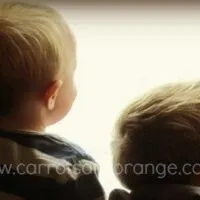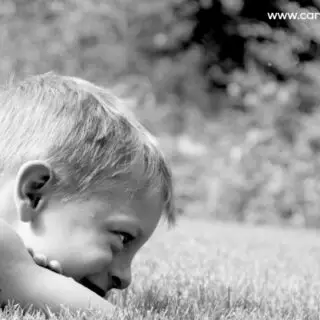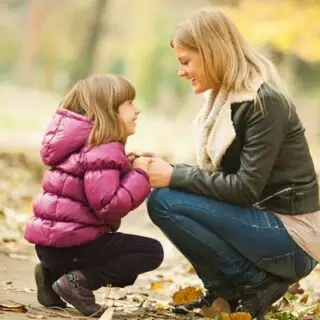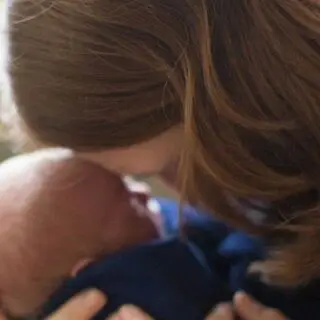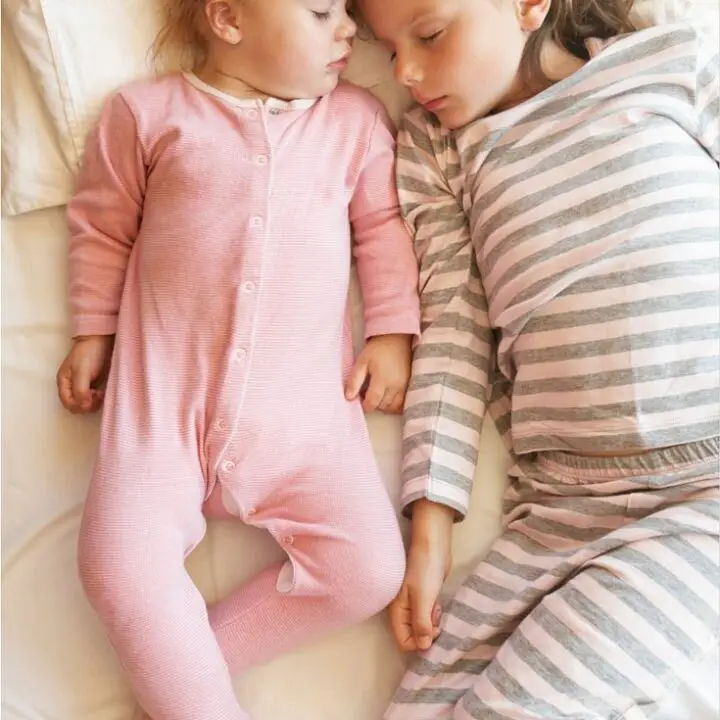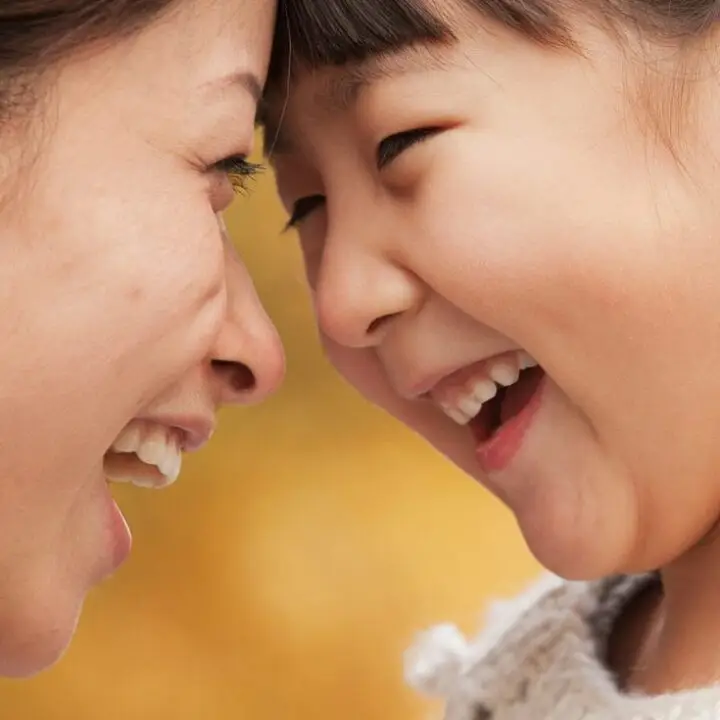I earn commissions from my affiliated links. Please see my disclosure policy for more details.
As parents and teachers, we often find ourselves at a loss for words. We want to connect with kids but sometimes don’t know where to start the conversation about their day. That’s why we’ve put together this massive list of open-ended questions for teachers and parents.
These questions will help spark conversation and connection between you and the child. Plus, often simply asking questions shows appreciation and helps us say “thank you kiddos” without having to say a word.
If you are an inquiry-based teacher or Montessori parent, these open-ended questions examples are perfect for you. Inquiry questions for kids are a way to get kids thinking on their terms and without any barriers.
These open-ended questions cover toddlers, preschoolers, and even older students. Use these questions for the “question of the day for kids” or use many questions at a family dinner.
Below you can download these questions in a convenient pdf!

Also, this list of questions for kids is not limited to your imagination! Add your thought-provoking questions for kids and grow this list.
Furthermore, these questions allow the adults in a child’s life to gather information to better guide the child. Above all else, observing a child amid this type of thinking is pretty exciting.
Simple questions often ignite creative thinking and ideas not previously imagined by the child.
Open-Ended Questions for Toddlers & Preschoolers
One of my big intentions as a parent is to allow children to solve problems and come up with solutions creatively. In other words, I desire children to think critically about a problem and embrace failure as an opportunity to iterate and improve.
A fantastic way to inspire this behavior than by asking questions. Also, asking funny questions is perfect for engaging kids!
In addition, I live by this approach in whatever we happen to be doing in life – brushing our teeth, building with legos, writing, climbing, changing the laundry, hiking, or any kind of STEAM project.
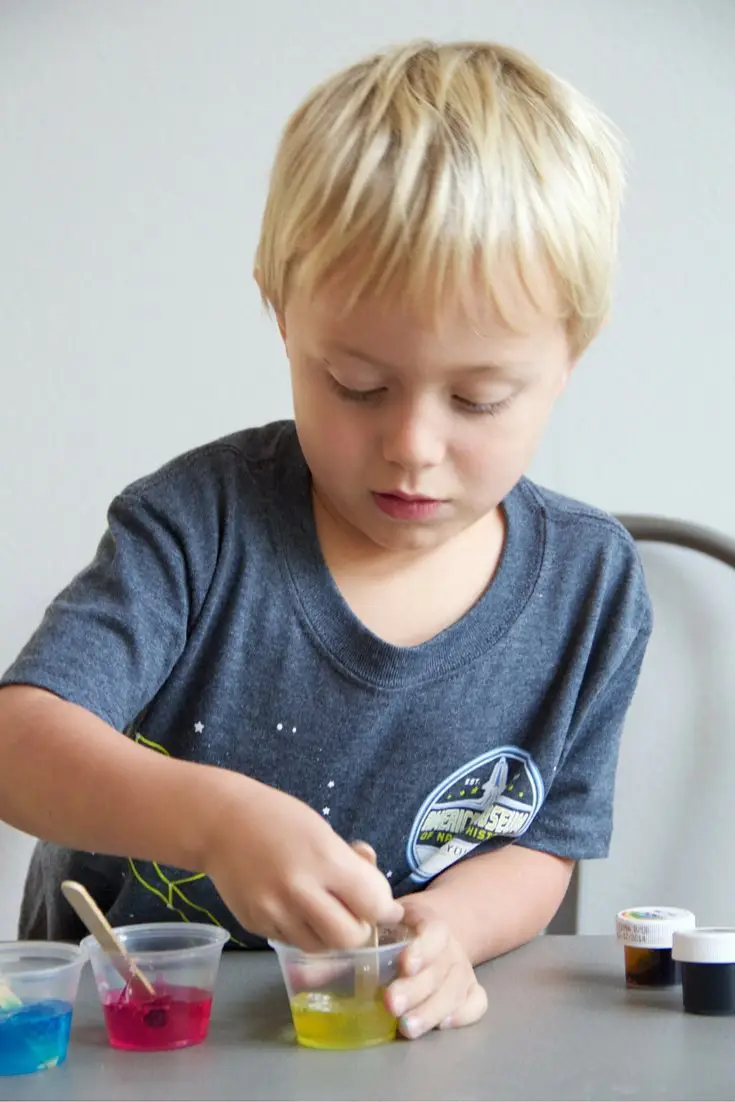
What are open-ended questions? Open-ended questions definition & more.
The definition of open-ended questions is broad. Before we dive into examples, I thought it would be helpful to go over why open-ended questions are so critical in a child’s learning & development. Furthermore, take a closer look at open-ended vs. closed questions.
Asking leading questions is similar to interviewing a witness on trial. Above all, the goal is to gather as much information as possible. Similarly, I use this approach in my parenting.
The same can be said for asking close-ended questions or questions with single-word answers such as “Yes” or “No.”
As you can conclude, close-ended questions can be answered without much detail. Likewise, multiple-choice questions are slightly better because the child can simply guess or choose what he believes you would like him to answer.
Finally, let’s go into the benefits of asking open-ended questions.
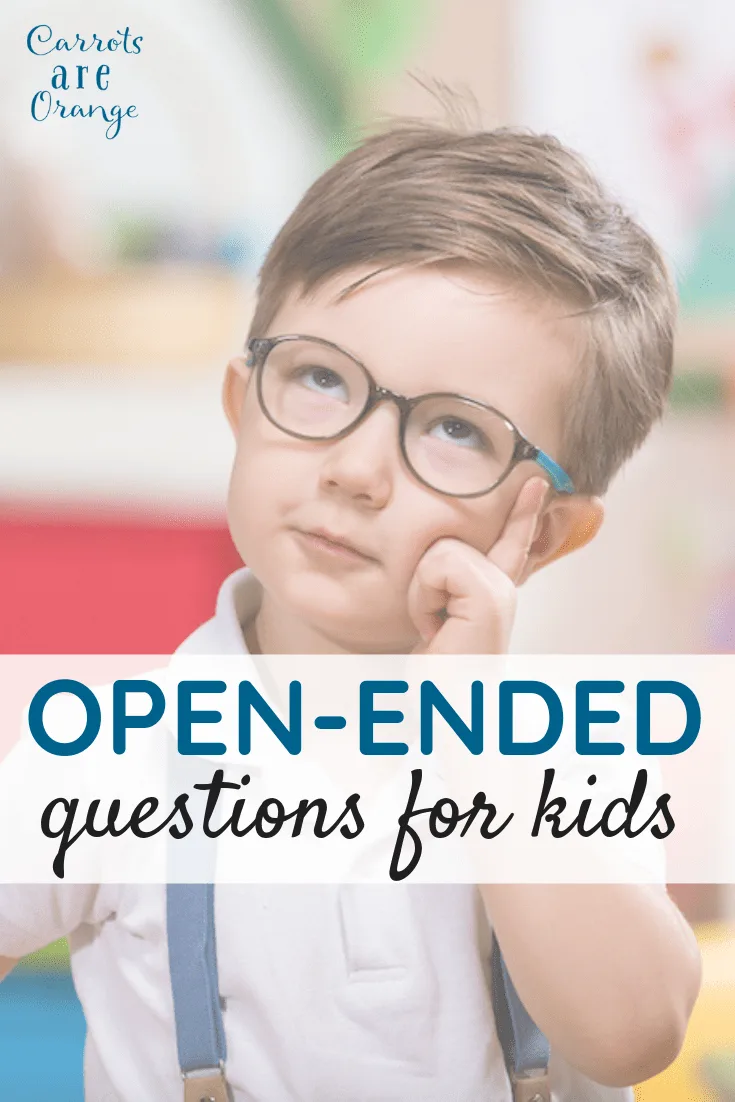
The Benefits
As parents, we always look for ways to understand our children better and encourage them to open up to us. One way to do this is by asking open-ended questions.
Open-ended questions cannot be answered with a simple “yes” or “no.” They require thought and usually begin with who, what, when, where, why, or how.
Benefit #1: Promote critical thinking.
When you ask your child an open-ended question, you encourage them to think critically about the answer. They have to process the inquiry and come up with a response that is more than just a single word. This type of thinking is an essential skill that will help them in school and life.
Benefit #2: Encourage communication.
Frequently, children are reluctant to communicate with their parents because they fear judgment or criticism. When you ask your child open-ended questions, you are letting them know that you are interested in hearing what they have to say without judgment.
This can help encourage them to communicate more freely with you about both good and bad experiences.
Benefit #3: Show that you value your child’s opinion.
Asking your child for their opinion shows that you value their thoughts and ideas. This can build self-confidence and help them feel more comfortable sharing their opinions with others.
Moreover, it can also help strengthen your relationship with your child as they feel like they can come to you with anything on their mind.

Examples of Close-Ended Questions
Below are examples of closed-ended questions to give you a perspective on the different approaches. Keep in mind that you might need to practice this approach.
- How was your day?
- Did you enjoy dinner?
- Do you like being a big brother?
- Which sport is your favorite?
- Do you have any pets?
- Which flavor of ice cream do you like best?
- Did you have fun playing at Joe’s house?
- Are you sad?
- What makes you mad?
- Do you enjoy skiing?
Examples of close-ended questions might look like this:
However, there are many opportunities to turn a close-ended question into an open-ended question. Furthermore, this step in the process might be a great segue as you train yourself to approach communication in an open-ended way.
For example, to change a close-ended question to an open-ended question, you might ask:
- Do you enjoy sports? Why?
- What is your favorite food & why?
- What is your favorite book?
- What is your favorite tv show?
- Why did you decide to draw a dragon?
- What is your favorite subject in school? Tell me more.
- If you could choose any activity to do in your free time, which activity would you choose & why?
The Importance of Asking Open-Ended Questions
Open-ended questions for kids are great for developing executive functioning skills. Above all else, keep in mind that children are natural problem solvers. However, a short window exists to nurture and encourage that innate curiosity.
Questions require room for pontification and teach children to think about the many angles of topics. Children who develop this thinking approach can navigate the world more successfully.
There are also communication benefits, as children can extensively explain their perspectives and detail their thinking. Encouraging questions where there is no right or wrong answer helps a child learn to think and not mention to develop confidence and conviction in their options.
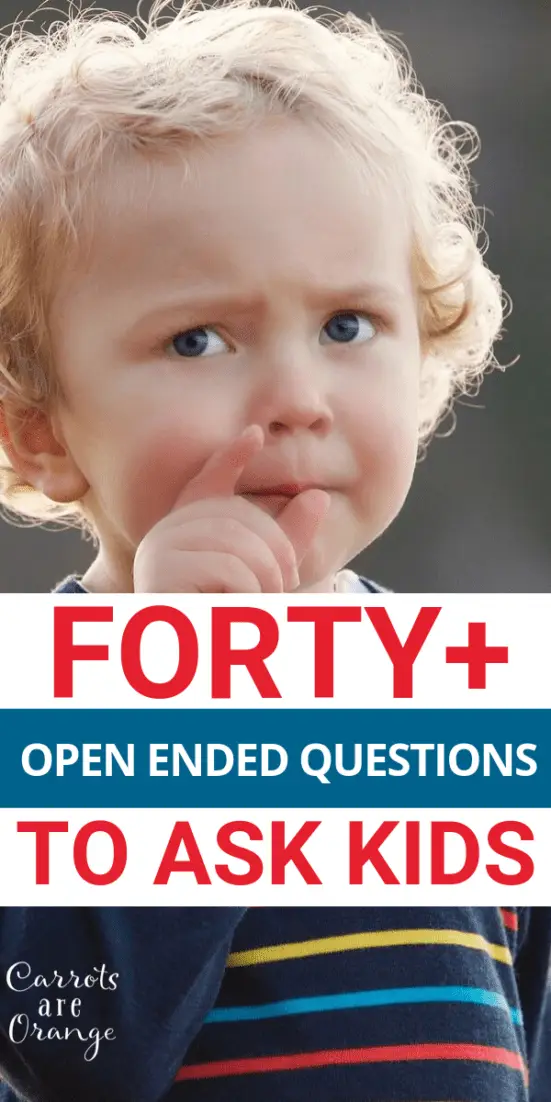
More Benefits of Asking Kids Questions & Open-Ended Questions Meaning
- A child can go deep on a specific topic
- More meaningful answers manifest
- The child owns his learning
- More engaged child
- The child naturally becomes more curious
- The motivation to want to learn more increases
- Develops research skills
- Encourages a growth mindset and personal responsibility
- Nurture critical thinking skills
- Teaches how to ask the right questions
Hopefully, these open-ended question examples for students will help you guide our little problem solvers!

Tips for Asking Open-Ended Questions
- Practice! When you ask a close-ended question (as I often do), work on transitioning it to an open-ended question.
- Keep an open mind
- Be creative
- Actively listen – you will be surprised how more questions naturally come to you while conversing with your child.
- Open-ended questions begin in precise ways using the following words: why, how, what, describe, tell me about…, or what do you think about…
- “What could happen if…”
- “I wonder why/what/if…”
- “How can we…”
- “Tell me more about it…”
- “In what way can/did/would…”
- “What would you do about…”
- “Why do you think…”
Examples of Open-Ended Questions for Students
One central point of asking open-ended questions for kids of all ages is gathering information. Below are several types of open-ended questions.
General Open-Ended Questions
- What would happen if…
- I wonder what…
- What do you think might happen when…
- How did that happen?
- How does it work?
- What do you think is happening?
- I wonder what will happen if we change this…
- What might you change?
- Can you think of…
- What is your plan?
- I wonder how…
- What made you think of that?
- What do you think might happen next?
- How could you…
- What do you see?
- Tell me why…
- What should we put here?
- Tell me what…
- Can you think of other ways to…
- Do you have any ideas…
- How could we figure that out?
- How do you come up with that solution?
- Tell me how…
- Help me fix this…
- Do you have any ideas for solutions?
- Are there any other ways we could…
- What you are thinking about?
- I wonder what will happen next…
- What might you keep the same?
- Now tell me about a time when…

Fun Questions to Ask Kids
- Would you rather eat apples every day or carrots?
- What is the best part of being the oldest/youngest/only child/middle child in your family?
- What would you do if you woke up with a tail in the morning?
- Would you rather be invisible or be able to fly? Why?
- Sweet or savory? Why?
- Pizza or Ice Cream? Why?
- Blue Whales or Bald Eagles? Why?
- If you could play any instrument, which instrument would you choose and why?
- If you could speak any language, which language would you choose and why?
- If you had a million dollars, what would you do with it?
- If you could start a business, what would it be?
- If you could be any animal, what would it be and why?
- If you could choose any superpower, what would it be and why?
- Do you think a baby’s cry tells us different things depending on the type of cry? Why?
- What do you think about Bigfoot?
- If the ocean could be any color, which color would you choose and why?
- If you could eat any food three times a day, 365 days a year, which food would you choose? Why? Is this a good or bad choice?
- If you could time travel, where would you go and why?
- Do you believe in ghosts? Why or why not?
- If your pet could talk, what do you think he would like to talk about?
- What is your favorite dinner? What about that dinner do you like?
- What type of music do you like? Why?
- How was someone kind to you today?
- What is your favorite subject to learn about?
- What do you think is the most challenging job? Why?
- If you were born into the Parr family from The Incredibles, which superpower would you hope to have?
- What is the most fun job you can think of? Why is it fun?
- Think about the movie “Cloudy with a Chance of Meatballs” – what food do you wish would fall from the sky?
- What is your favorite smell? Why?
- Beach or Mountains? Why?
- Unicorns or Mermaids? Why?
- If you were an animal, would you prefer to be an omnivore or an herbivore?
- If you were an animal, would you prefer to live on land or in the water?
- Why do you think big dogs bark so excited when they see little dogs?
- What do you think is the best way to calm an excited dog?
- Dogs or Cats? Why?
- What magic power do you wish you had? Why?
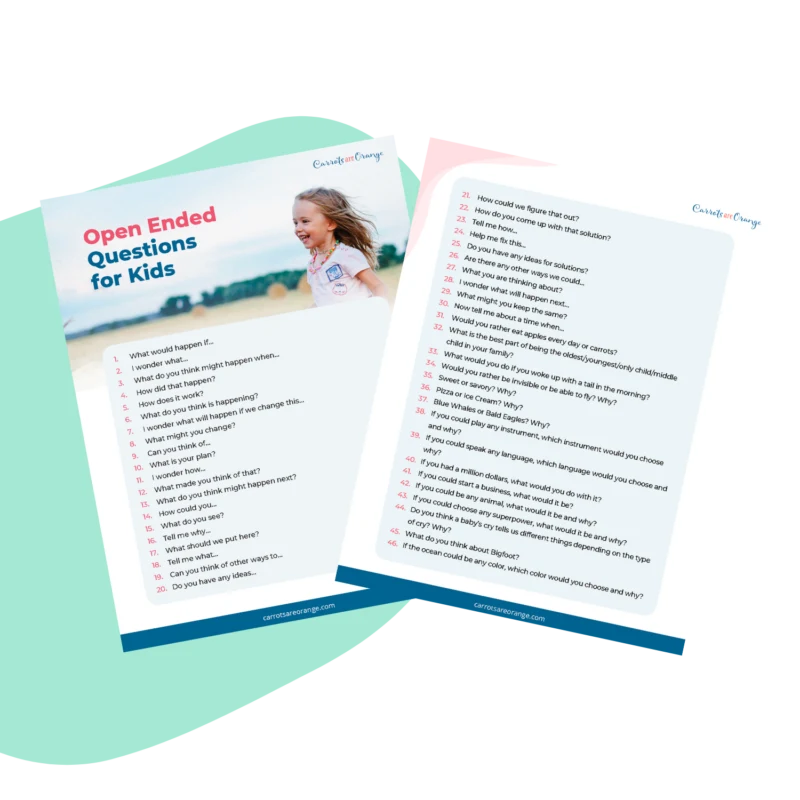
Questions about School for Kids
- Why did you choose that book to read?
- Which character is your favorite & why?
- What do you need to do to begin the project?
- Will you tell me about a time when someone was kind to you today?
- Which season is your favorite and why?
- If you could travel to any place in the universe, where would you travel and why?
- How did you complete that chore/task/activity so well?
- Who is your favorite teacher? What makes him so unique?
- If you could teach any subject, what would it be and why?
- If you were the principal for the day, what would you do? Make any changes?
Open End Questions for Preschoolers
- What are you most excited about when you wake up in the morning?
- Do you think animals can communicate? How?
- What is your favorite food?
- What is your favorite color?
- What is your favorite animal?
- What’s your favorite thing to do when you’re outside?
Open-Ended Questions about Pets
- What do you think a day in the life of your pet is like?
- If your pet could talk, what do you think it would say to you?
- What kind of games do you think your pet would love to play if they could play any game in the world?
- If you could ask your pet three questions and get answers, what would you ask?
- What do you think is the most important thing to do to take care of a pet?
- If your pet had a superpower, what do you think it would be and why?
- How do you think your pet feels when you’re away from home?
- If you could take your pet on a vacation anywhere in the world, where would you take them and why?
- What do you think your pet dreams about at night?
- If your pet could have any job in the world, what do you think it would be?
Open Ended Questions about Animals
- If you could be any animal for a day, which one would you choose and why?
- What do you think animals dream about when they sleep?
- How do you think animals communicate with each other? Can you mimic any animal sounds?
- If you could invent a new animal, what features would it have and what would you name it?
- What is your favorite animal, and what makes it so special to you?
- If you could talk to animals, what would be the first thing you’d ask them?
- Imagine a world where animals could build their own houses. What would a house designed by a specific animal look like?
- If animals had jobs, what kind of job do you think your favorite animal would have?
- How are humans similar to animals, and how are we different?
- If you could have an animal sidekick, which animal would you choose, and what adventures would you go on together?

Social-Emotional Question of the Day
- What is something that made you smile or feel happy yesterday, no matter how small?
- How do you typically cope with stress, and is there a new strategy you’d like to try?
- Can you share a recent accomplishment or moment of personal growth that you’re proud of?
- Who is someone in your life that you’re grateful for, and why?
- Describe a time when you faced a challenge or setback. How did you overcome it, and what did you learn from the experience?
- What is a personal goal you’re currently working towards, and what steps are you taking to achieve it?
- Reflect on a time when you felt a strong sense of empathy or compassion for someone. What did that experience teach you about yourself?
- Is there a positive affirmation or mantra that helps boost your confidence or self-esteem? Share it with the group.
- What is one small act of kindness you can do today to make someone else’s day better?
- How do you recharge and take care of your mental and emotional well-being? Share a self-care practice that works for you.
Questions for Older Kids
- What do you believe means you have a good life?
- What does it mean to love?
- When you have to make a decision, how do you do it?
- Can you describe a dream you’ve had and what you think it means?
- What are your favorite board games, and why do you enjoy playing them?
- What is your favorite sport, and why?
- What do you think the iPhone will be like in 25 years?
- What is your perfect day?
- When you close your eyes, and I ask you to think of a place that makes you happy, what is that place like?
- When you wake up in the morning, what are your first thoughts?
- When you find yourself daydreaming, what do you think about it?
- If you could change one family/classroom rule, which one would it be and why?
- What makes a friend a friend?
- How would you change the world if you could?
- What makes someone smart?
- What is your greatest strength? Weakness?
- What do you think you will be doing in 5 years? Ten years? 20 years from now?
Another fantastic way to get kids to communicate is by using word clouds. It is a type of brainstorming that ignites a child’s use of language and helps him convey his thoughts and feelings.
Related Read: Why Asking Simple Opened-Ended Questions Matters
Have fun with these questions and get kids thinking! Kids are natural problem solvers and scientists!
Click on the image below to download this list for FREE!

Related Reads
Related Parenting Articles
Download Now!
Grab 25+ Open Ended Questions for Curious Kids by entering your name and email!

